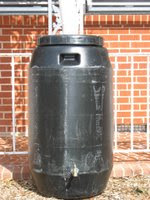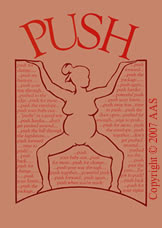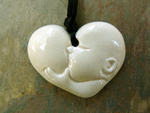Two great people I admire and appreciate, Tim Russert and Edwina Froehlich, passed away this week. I doubt that Edwina will get the extensive coverage that Russet gets, but she should. Wouldn't it be a great world if the pioneers of promoting what mamas and babies need would be elevated to that of politicians, warmongers, wrong-doers, journalists, and oh, yeah, Hollywood stars? (Not that Mr. Russert was any of those).
Who is Edwina Froehlich, most people ask? She is the founder of the Le Leche League.
When I gave birth to my first child in 1975 breast-feeding was discouraged and it was socially the wrong thing to do. I was breast-fed, as was my mother, a twin, in 1930. I know now that ancestral memory is a contributor of success in breast-feeding. Thank God, because two nurses kept my baby from me and waited for my husband and mother to leave (I believe now). They worked very hard to discourage me ... "You are too young. It will tie you down." (Edwina was too old! What is the perfect age? How absurd that the childbearing body would be too anything to finish the task.) They said, "Formula is better." As they continued to brow-beat me and I resisted, as one said smugly, "We already gave him formula and he took it just fine." Fortunately, my sweet baby latched on like he'd been doing it forever. (So glad I had nursed my dollies along with my sister being breast-fed). I suspect (in my feeling, sensate awareness now) that my eighteen-year old look (or smirk as my mother would call such a look) said, "Ha!!! So F-you and go away," because they did. Thankfully.
Twenty-eight years later I was at a lactation training and when I heard the instructor say that the FIRST FEEDING COATS and PRIMES the gut system, a rage rose up in me. Seemingly outa of nowhere my usual "cool, calm, and collected" self felt and explosion boiling up. THAT feeling is the expression of the feelings and knowing of my body at the time ... that were suppressed and denied. I had to leave the room and go to privacy in the bathroom to do the things I know as a clinician of trauma healing to discharge it.
The feelings? How dare they? How dare they take away something so fundamentally necessary and simple.? Were his hospitalizations at age four for bowel issues related? What do we women (and men) do with our stuffed emotions about our violations during this most profound human experience -- birth? Woman have to stop doing this --- betrayal --- to other women.
Thank YOU, Edwina -- for you have contributed to my life personally and you have surely made the world a better place for eons to come.
June 13, 2008
Edwina Froehlich, 93, La Leche League Pioneer, Is Dead
By RONI CARYN RABIN
Edwina Froehlich, who was inspired to help found La Leche League to support breast-feeding after being told at the age of 35 that she was too old to make breast milk for her baby, died Sunday in Arlington Heights, Ill. She was 93 and lived in Inverness, Ill.
Her death followed a stroke two weeks earlier, said her son, Assemblyman Paul D. Froehlich.
A pioneer on several fronts of motherhood, she worked for Young Christian Workers, a Roman Catholic lay organization, before marrying John Froehlich when she was in her early 30s. She had her first child a couple of years later, making her comparatively old to have a first child at the time, and she made the controversial decision to forgo giving birth in a hospital in favor of a more natural delivery in her Franklin Park, Ill., home, with an obstetrician attending.
At a time when most pediatricians encouraged formula and bottle-feeding and when there were few scientific studies demonstrating the health benefits of breast milk, Mrs. Froehlich chose to breast-feed all of her babies, said another La Leche founder, Mary White.
"We used to tell the mothers the three main obstacles to successful breast-feeding were doctors, hospitals, and social pressure," Mrs. White said.
In 1956, when Mrs. White and a friend, Marian Tompson, decided to start a community organization to support and educate local breast-feeding mothers, Mrs. Froehlich was one of the first women they approached. Soon, monthly meetings were being held in Mrs. Froehlich's home, and a new phone line was installed so she could answer questions coming in from mothers across the country, Mrs. White said.
"We didn't have any information, " said Mrs. Tompson, another of the original group of seven La Leche League founders. "There weren't any books out there, and women just didn't talk about these things. Only 18 percent of women in the U.S. left the hospital breast-feeding at that time."
As La Leche League of Franklin Park grew, becoming La Leche League International in 1964, Mrs. Froehlich took on additional roles, including serving as assistant executive director for many years and, more recently, as a board member and a member of the Founders' Advisory Council.
She was one of the authors of "The Womanly Art of Breast-feeding, " the league's manifesto, which was first put together in loose-leaf form in 1958 and later published as a bound book in 1963. More than two million copies are in print.
Mrs. Froehlich was born Edwina Hearn on Jan. 5, 1915, in the Bronx.
In addition to her son Paul, of Schaumburg, Ill., she is survived by two other sons, Peter and David, who live in the Chicago area; a sister, Pauline, who lives in North Carolina; and nine grandchildren. Her husband, John, died in 1997.
Mrs. Froehlich donated her body to the University Of Illinois for research; her children think she wanted to continue serving science even after her death.
The Other Side of the Glass
Part One was officially released June 2013 in digital distribution format.
To purchase to to www.theothersideoftheglass.com
If you were a donor and want to download your copy send an email to theothersideoftheglassfilm@gmail.com.
The trailer
Saturday, June 14, 2008
Subscribe to:
Post Comments (Atom)
"Soft is the heart of a child. Do not harden it."
A public awareness reminder that things that happen behind the scenes, out of our sight, aren't always as rosy as we might think them to be. Perhaps its a restaurant cook who accidentally drops your burger
on the floor before placing it on the bun and serving it to you. Here it's an overworked apathetic (pathetic) nurse giving my newborn daughter her first bath.
Please comment and rate this video, so as to insure that it is viewed as widely as possible, perhaps to prevent other such abuse. -- The mother who posted this YouTube. How NOT to wash a baby on YouTube
Are you going to try to tell me that "babies don't remember?" There is no difference to this baby's experience and the imprinting of her nervous system/brain and one that is held and cleaned by the mother or father either at the hospital or at home?
By the way, this is probably NOT the baby's first bath. The nurse is ungloved. Medical staff protocol is that they can't handle a baby ungloved until is has been bathed (scrubbed if you've seen it) because the baby is a BIO-HAZARD -- for them. Never mind that the bio-hazard IS the baby's first line of defense against hospital germs.
Missouri Senator Louden Speaks
Finally, A Birth Film for Fathers
Part One of the "The Other Side of the Glass: Finally, A Birth Film for and about Men" was released June, 2013.
Through presentation of the current research and stories of fathers, the routine use of interventions are questioned. How we protect and support the physiological need of the human newborn attachment sequence is the foundation for creating safe birth wherever birth happens.
Based on knowing that babies are sentient beings and the experience of birth is remembered in the body, mind, and soul, fathers are asked to research for themselves what is best for their partner and baby and to prepare to protect their baby.
The film is designed for midwives, doulas, and couples, particularly fathers to work with their caregivers. Doctors and nurses in the medical environment are asked to "be kind" to the laboring, birthing baby, and newborn. They are called to be accountable for doing what science has been so clear about for decades. The mother-baby relationship is core for life. Doctors and nurses and hospital caregivers and administrators are asked to create protocols that protect the mother-baby relationship.
Men are asked to join together to address the vagaries of the medical system that harm their partner, baby and self in the process of the most defining moments of their lives. Men are asked to begin to challenge the system BEFORE they even conceive babies as there is no way to be assured of being able to protect his loved ones once they are in the medical machine, the war zone, on the conveyor belt -- some of the ways that men describe their journey into fatherhood in the medicine culture.
Donors can email theothersideoftheglassfilm@gmail.com to get a digital copy.
Through presentation of the current research and stories of fathers, the routine use of interventions are questioned. How we protect and support the physiological need of the human newborn attachment sequence is the foundation for creating safe birth wherever birth happens.
Based on knowing that babies are sentient beings and the experience of birth is remembered in the body, mind, and soul, fathers are asked to research for themselves what is best for their partner and baby and to prepare to protect their baby.
The film is designed for midwives, doulas, and couples, particularly fathers to work with their caregivers. Doctors and nurses in the medical environment are asked to "be kind" to the laboring, birthing baby, and newborn. They are called to be accountable for doing what science has been so clear about for decades. The mother-baby relationship is core for life. Doctors and nurses and hospital caregivers and administrators are asked to create protocols that protect the mother-baby relationship.
Men are asked to join together to address the vagaries of the medical system that harm their partner, baby and self in the process of the most defining moments of their lives. Men are asked to begin to challenge the system BEFORE they even conceive babies as there is no way to be assured of being able to protect his loved ones once they are in the medical machine, the war zone, on the conveyor belt -- some of the ways that men describe their journey into fatherhood in the medicine culture.
Donors can email theothersideoftheglassfilm@gmail.com to get a digital copy.
Buy the film at www.theothersideoftheglass.com.
The film focuses on the male baby, his journey from the womb to the world and reveals healing and integrating the mother, father, and baby's wounded birth experience. The film is about the restoring of our families, society, and world through birthing loved, protected, and nurtured males (and females, of course). It's about empowering males to support the females to birth humanity safely, lovingly, and consciously.
Finally, a birth film for fathers.
The film focuses on the male baby, his journey from the womb to the world and reveals healing and integrating the mother, father, and baby's wounded birth experience. The film is about the restoring of our families, society, and world through birthing loved, protected, and nurtured males (and females, of course). It's about empowering males to support the females to birth humanity safely, lovingly, and consciously.
Finally, a birth film for fathers.
What People Are Saying About the FIlm
Well, I finally had a chance to check out the trailer and .. wow! It's nice that they're acknowledging the father has more than just cursory rights (of course mom's rights are rarely acknowledged either) and it's great that they're bringing out the impact of the experience on the newborn, but I'm really impressed that they're not shying away from the political side.
They are rightly calling what happens in every American maternity unit, every day, by its rightful name - abuse. Abuse of the newborn, abuse of the parents and their rights, abuse of the supposedly sacrosanct ethical principal of patient autonomy and the medico-legal doctrine of informed consent, which has been long ago discarded in all but name. I love it!
In the immortal words of the "shrub", "bring it on!" This film needs to be shown and if I can help facilitate or promote it, let me know.
Father in Asheville, NC
Thanks for sharing this. It was very touching to me. I thought of my brother-in-law standing on the other side of the glass when my sister had to have a C-section with her first child because the doctor was missing his golf date. I'll never forget his pacing back and forth and my realizing that he was already a father, even though he hadn't been allowed to be with his son yet.
Margaret, Columbia, MO
They are rightly calling what happens in every American maternity unit, every day, by its rightful name - abuse. Abuse of the newborn, abuse of the parents and their rights, abuse of the supposedly sacrosanct ethical principal of patient autonomy and the medico-legal doctrine of informed consent, which has been long ago discarded in all but name. I love it!
In the immortal words of the "shrub", "bring it on!" This film needs to be shown and if I can help facilitate or promote it, let me know.
Father in Asheville, NC
OMG'ess, I just saw the trailer and am in tears. This is so needed. I watch over and over and over as fathers get swallowed in the fear of hospitals birth practice. I need a tool like this to help fathers see how very vital it is for them to protect their partner and baby. I am torn apart every time I see a father stand back and chew his knuckle while his wife is essentially assaulted or his baby is left to lie there screaming.
Please send me more info!!!!
Carrie Hankins
CD(DONA), CCCE, Aspiring Midwife
720-936-3609
Thanks for sharing this. It was very touching to me. I thought of my brother-in-law standing on the other side of the glass when my sister had to have a C-section with her first child because the doctor was missing his golf date. I'll never forget his pacing back and forth and my realizing that he was already a father, even though he hadn't been allowed to be with his son yet.
Margaret, Columbia, MO
In case you don't find me here
Soon, I'll be back to heavy-duty editing and it will be quiet here again. I keep thinking this blog is winding down, and then it revives. It is so important to me.
I wish I'd kept a blog of my journey with this film this past 10 months. It's been amazing.
I have a new blog address for the film, and will keep a journal of simple reporting of the journey for the rest of the film.
www.theothersideoftheglassthefilm.blogspot.com
I'll be heading east this week to meet with a group of men. I plan to post pictures and clips on the film blog.
I'll keep up here when I can -- when I learn something juicy, outrageous, or inspiring related to making birth safer for the birthing baby.
I wish I'd kept a blog of my journey with this film this past 10 months. It's been amazing.
I have a new blog address for the film, and will keep a journal of simple reporting of the journey for the rest of the film.
www.theothersideoftheglassthefilm.blogspot.com
I'll be heading east this week to meet with a group of men. I plan to post pictures and clips on the film blog.
I'll keep up here when I can -- when I learn something juicy, outrageous, or inspiring related to making birth safer for the birthing baby.
Review of the film
Most of us were born surrounded by people who had no clue about how aware and feeling we were. This trailer triggers a lot of emotions for people if they have not considered the baby's needs and were not considered as a baby. Most of us born in the US were not. The final film will include detailed and profound information about the science-based, cutting-edge therapies for healing birth trauma.
The full film will have the interviews of a wider spectrum of professionals and fathers, and will include a third birth, at home, where the caregivers do a necessary intervention, suctioning, while being conscious of the baby.
The final version will feature OBs, RNs, CNMs, LM, CPM, Doulas, childbirth educators, pre and perinatal psychologists and trauma healing therapists, physiologists, neurologists, speech therapists and lots and lots of fathers -- will hopefully be done in early 2009.
The final version will include the science needed to advocated for delayed cord clamping, and the science that shows when a baby needs to be suctioned and addresses other interventions. Experts in conscious parenting will teach how to be present with a sentient newborn in a conscious, gentle way -- especially when administering life-saving techniques.
The goal is to keep the baby in the mother's arms so that the baby gets all of his or her placental blood and to avoid unnecessary, violating, and abusive touch and interactions. When we do that, whether at home or hospital, with doctor or midwife, the birth is safe for the father. The "trick" for birthing men and women is how to make it happen in the hospital.
The full film will have the interviews of a wider spectrum of professionals and fathers, and will include a third birth, at home, where the caregivers do a necessary intervention, suctioning, while being conscious of the baby.
The final version will feature OBs, RNs, CNMs, LM, CPM, Doulas, childbirth educators, pre and perinatal psychologists and trauma healing therapists, physiologists, neurologists, speech therapists and lots and lots of fathers -- will hopefully be done in early 2009.
The final version will include the science needed to advocated for delayed cord clamping, and the science that shows when a baby needs to be suctioned and addresses other interventions. Experts in conscious parenting will teach how to be present with a sentient newborn in a conscious, gentle way -- especially when administering life-saving techniques.
The goal is to keep the baby in the mother's arms so that the baby gets all of his or her placental blood and to avoid unnecessary, violating, and abusive touch and interactions. When we do that, whether at home or hospital, with doctor or midwife, the birth is safe for the father. The "trick" for birthing men and women is how to make it happen in the hospital.








No comments:
Post a Comment